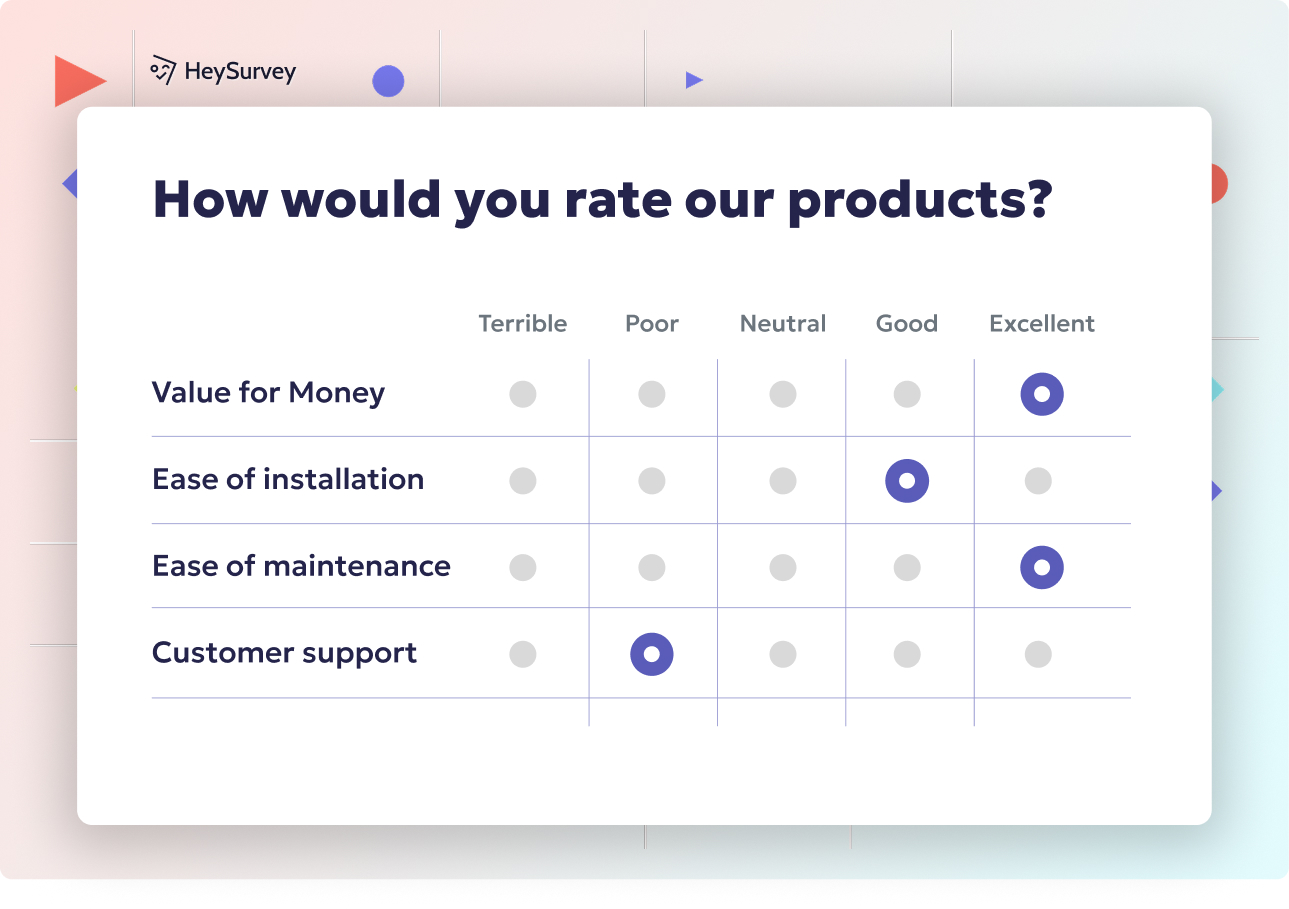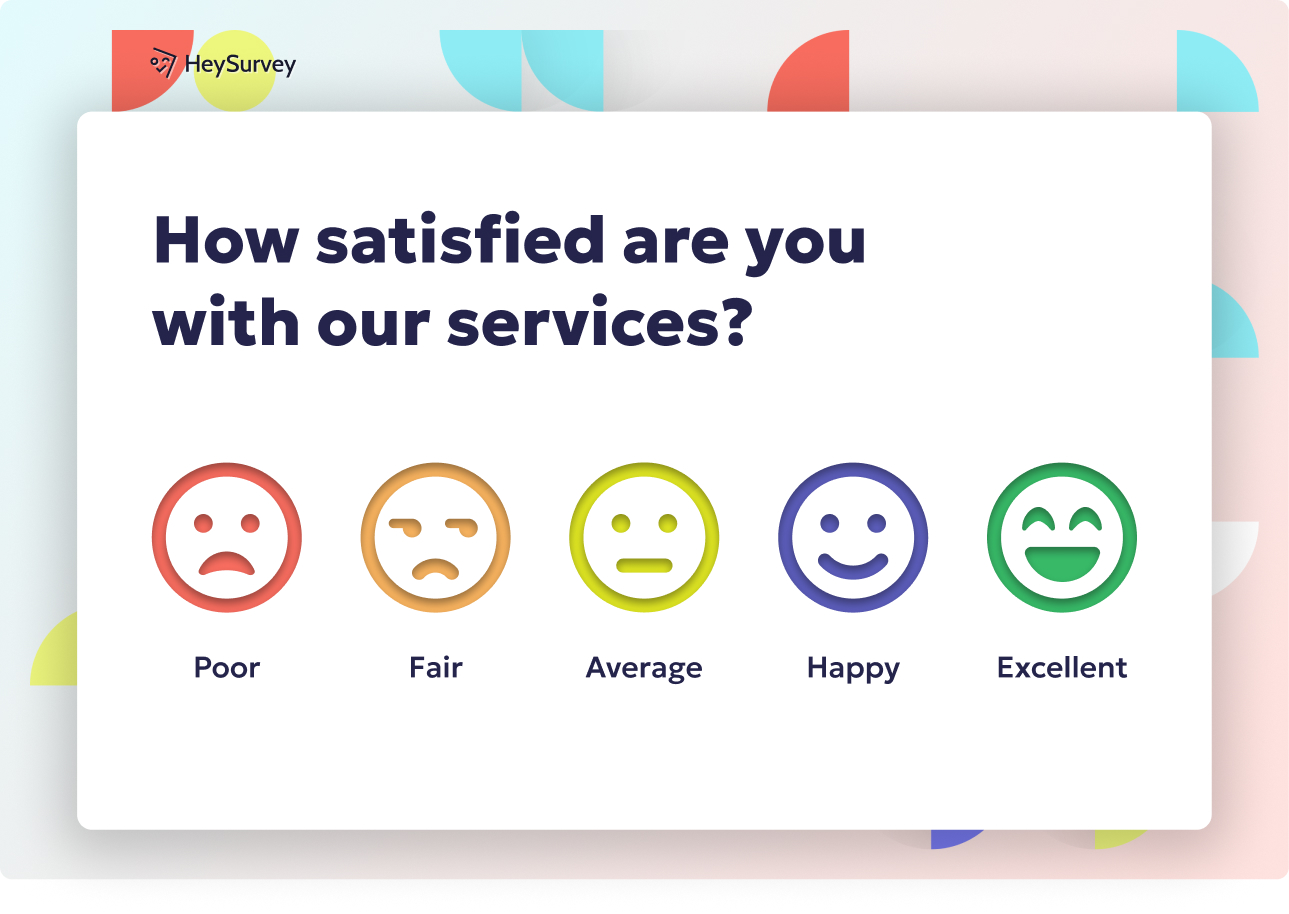25 Knowledge Survey Questions Examples for Effective Testing
Explore 25+ knowledge survey questions examples across 7 types, with tips on crafting high-impact quizzes for learning and development success.
Introduction – The Strategic Role of Knowledge Surveys
Knowledge surveys are tools designed to assess an individual's understanding of specific topics, distinguishing them from opinion or satisfaction surveys that gauge personal feelings or experiences. Organizations, educators, and learning and development (L&D) teams utilize these surveys for various purposes, including:
- Skills Gap Analysis: Identifying areas where employees or students may need further training.
- Compliance Validation: Ensuring adherence to industry standards and regulations.
- Curriculum Design: Informing the development of educational programs based on existing knowledge levels.
- Onboarding Efficiency: Streamlining the integration of new team members by assessing their current knowledge base.
This article explores seven types of knowledge survey questions, each accompanied by guidance on their optimal use and practical sample questions.
Multiple-Choice Knowledge Surveys
What It Is: Closed-ended questions offering a set of predefined answers, with only one correct option.
Why & When to Use: Ideal for quickly assessing knowledge, benchmarking against cohorts, and certifying baseline understanding.
Sample Questions:
- Which of the following is NOT a benefit of two-factor authentication?
- What is the primary function of a DNS resolver?
- Which programming language is primarily used for iOS app development?
- What does HTTP stand for in web protocols?
- Which of the following is a characteristic of a well-designed survey question?
Tips:
- Plausible Distractors: Craft incorrect options that are believable to avoid easy elimination.
- Avoid "All of the Above": This option can sometimes be a giveaway; use it sparingly.
Writing multiple-choice questions enhances medical students' learning, leading to improved exam performance. (bmcmededuc.biomedcentral.com)

Creating your knowledge survey with HeySurvey is a breeze—even if you’re brand new! Just follow these three simple steps and you’ll have your knowledge check ready to roll. Plus, there are bonus tips to make it look sharp and work even smarter.
Step 1: Create a New Survey
Head over to your HeySurvey dashboard and click “Create Survey”. You can start with a blank slate or pick a template tailored for knowledge surveys—templates save you time with ready-made question structures. Don’t worry if you don’t have an account yet; you can start building without signing up, but to publish and collect responses, registration is needed.
Step 2: Add Your Questions
In the Survey Editor, click “Add Question” to pick question types like multiple-choice, true/false, Likert scales, or open-ended responses. Input your question text, add descriptions or images, and set whether questions are required. Mix and match question types to fit your learning objectives perfectly. Feel free to duplicate similar questions to speed things up!
Step 3: Publish and Share
Once your questions are in place, hit “Preview” to test the flow and design. Tweak colors, fonts, and layout in the Designer Sidebar for a polished look. When you’re happy, click “Publish”—this generates a shareable link to send out to your audience or embed on your website. Remember, you’ll need a HeySurvey account to finalize publishing and view responses later.
Bonus Step: Apply Your Branding
Make the survey yours by uploading your logo and customizing colors and fonts to match your organization’s style. This builds trust and makes surveys look professional.
Bonus Step: Define Settings or Skip Into Branches
Set parameters like start and end dates, response limits, or redirect URLs after completion to tailor the survey experience. Also, add branching rules to guide respondents through different question paths based on their earlier answers, making surveys smart and personalized.
Ready to jump in? Start your own knowledge survey with a handy template right below!
For more inspiration on question design, check out these knowledge survey examples to see what works best.
True/False (Binary) Knowledge Checks
What It Is: Questions requiring a yes/no or true/false response to assess discrete facts.
Why & When to Use: Suitable for quick assessments during micro-learning sessions, reducing cognitive load, and effective in mobile-first quizzes.
Sample Questions:
- True or False: IPv6 uses 128-bit addresses.
- True or False: The capital of Australia is Sydney.
- True or False: Water boils at 100°C at sea level.
- True or False: The Earth is the fourth planet from the Sun.
- True or False: Shakespeare wrote "Pride and Prejudice."
Tips:
- Risk of Guessing Bias: With only two options, there's a 50% chance of guessing correctly. To mitigate this, include more than 10 items to balance the probability.
True-false tests can enhance long-term retention of studied information compared to rereading, especially when students evaluate both true and false statements. (pubmed.ncbi.nlm.nih.gov)
Likert-Scale Self-Assessment Knowledge Surveys
What It Is: Respondents rate their perceived mastery on a scale (e.g., 1 = "Not at all confident" to 5 = "Expert").
Why & When to Use: Effective for identifying perception gaps before and after training, blending subjective assessments with objective tests, and fostering metacognition.
Sample Questions:
- How confident are you in configuring a pivot table in Excel?
- How well do you understand the principles of object-oriented programming?
- How comfortable are you with conducting a SWOT analysis?
- How proficient are you in using advanced Excel functions?
- How confident are you in your ability to lead a team meeting?
Tips:
- Wording Neutrality: Ensure questions are phrased without bias to maintain objectivity.
- Consistent Scale Labels: Use uniform descriptors across questions to avoid confusion.
Open-Ended Knowledge Demonstrations
What It Is: Questions that require free-text responses, prompting explanations, calculations, or definitions.
Why & When to Use: Ideal for delving into complex subjects, gathering qualitative insights, and informing curriculum revisions.
Sample Questions:
- Describe the primary function of a DNS resolver.
- Explain the difference between RAM and ROM in computer systems.
- What are the key steps in conducting a market analysis?
- How would you approach troubleshooting a network connectivity issue?
- Define the concept of cloud computing and its benefits.
Tips:
- Rubric Creation: Develop clear criteria for evaluating responses to maintain consistency.
- Automated Text-Analysis Tools: Utilize software to efficiently analyze qualitative data.
Open-ended questions in surveys elicit detailed, qualitative responses, providing deeper insights into respondents' experiences and perspectives. (indeed.com)
Scenario-Based (Situational Judgment) Knowledge Surveys
What It Is: Realistic scenarios prompting respondents to apply knowledge to choose the best course of action.
Why & When to Use: Assessing the transfer of learning, decision-making in soft skills, and understanding compliance scenarios.
Sample Questions:
- A customer emails sensitive data. Which GDPR article governs your next step?
- You're leading a team meeting, and a conflict arises between two members. How do you handle the situation?
- A client requests a feature that contradicts company policy. How do you respond?
- During a software deployment, an unexpected error occurs. What is your immediate course of action?
- A team member consistently misses deadlines. How do you address this issue?
Tips:
- Branching Logic: Use logic to direct respondents to relevant follow-up questions based on their answers.
- Narrative Clarity: Ensure scenarios are clearly written to avoid confusion.
Ranking & Ordering Knowledge Surveys
What It Is: Respondents rank or order items in a sequence, such as steps in a process or priorities.
Why & When to Use: Testing process knowledge, prioritization skills, and understanding of chronological events.
Sample Questions:
- Rank the software development lifecycle phases from first to last.
- Order the steps of the scientific method in the correct sequence.
- Arrange the stages of team development from forming to adjourning.
- Prioritize the following tasks based on their importance in project management.
- Sequence the events leading up to the American Revolution.
Tips:
- Ambiguity in Item Labels: Ensure labels are clear to prevent misinterpretation.
Checklist / Select-All-That-Apply Knowledge Surveys
What It Is: Questions where multiple correct answers are possible, and respondents select all relevant options.
Why & When to Use: Gauging the breadth of knowledge, identifying partial understanding, and reducing the likelihood of correct answers by chance.
Sample Questions:
- Select all ports commonly used for secure email protocols.
- Which of the following are primary colors?
- Identify all the planets in our solar system.
- Which of these are renewable energy sources?
- Select all the elements that are noble gases.
Tips:
- Disclose Number of Correct Answers: Only if pedagogically justified, inform respondents how many correct answers to expect.
Best Practices – Dos and Don’ts for High-Impact Knowledge Survey Questions
Dos:
- Align Questions with Learning Objectives: Ensure each question ties back to the desired outcomes.
- Pilot Test: Conduct trials to identify and rectify issues before full deployment.
- Balance Difficulty: Mix easy and challenging questions to maintain engagement.
- Use Clear Language: Avoid jargon and complex phrasing to ensure understanding.
- Provide Feedback Loops: Offer explanations for correct and incorrect answers to enhance learning.
Don’ts:
- Write Double-Barreled Questions: Avoid asking two questions in one, which can confuse respondents.
- Use Negative Phrasing: Steer clear of questions like "Which of the following is NOT..." to prevent confusion.
- Overload Cognitive Capacity: Keep surveys concise to prevent respondent fatigue.
- Ignore Accessibility: Ensure surveys are
Related Training Survey Surveys
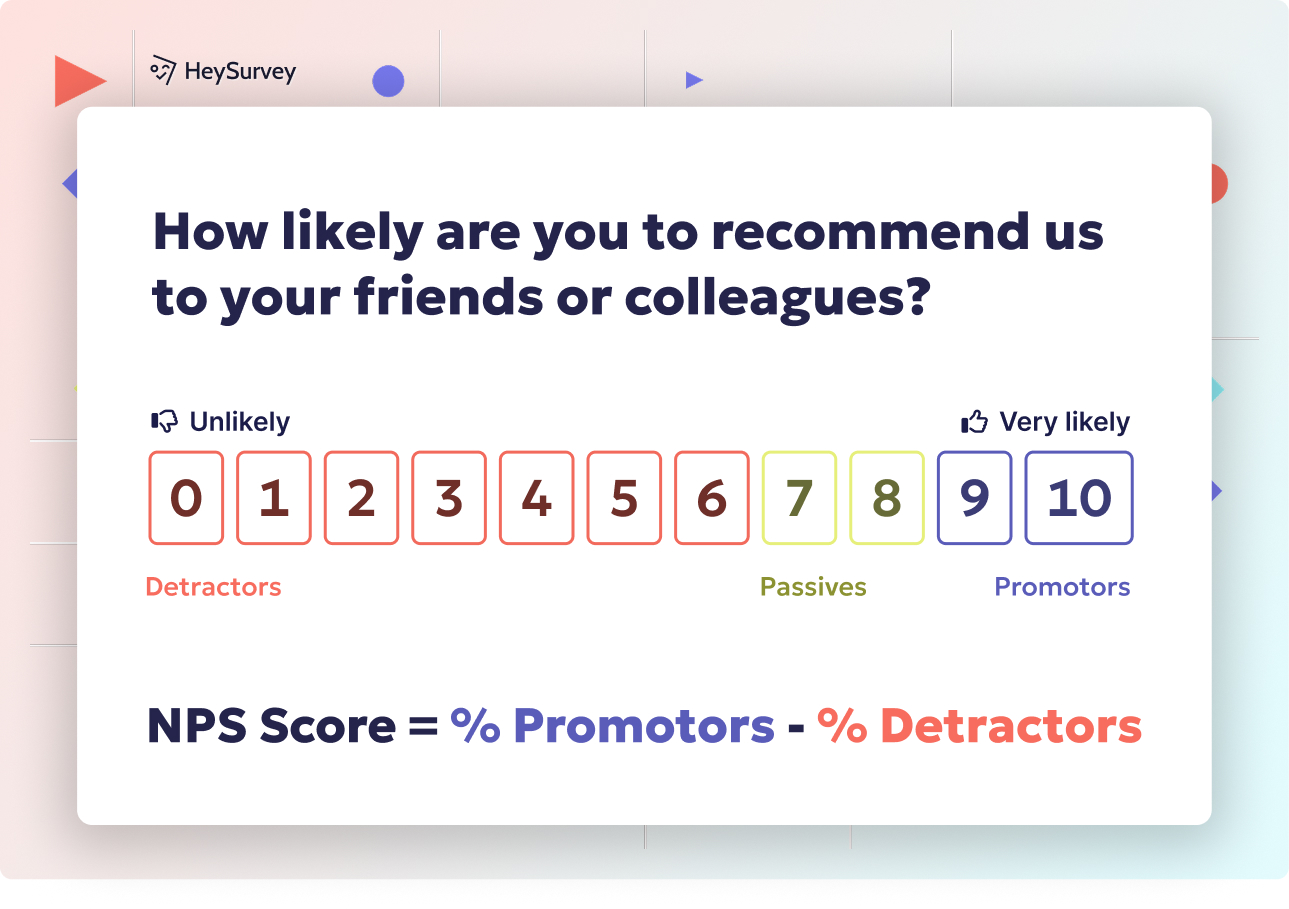
31 Professional Development Evaluation Survey Questions Guide
Discover 40+ professional development evaluations survey questions with 8 types of surveys to boo...
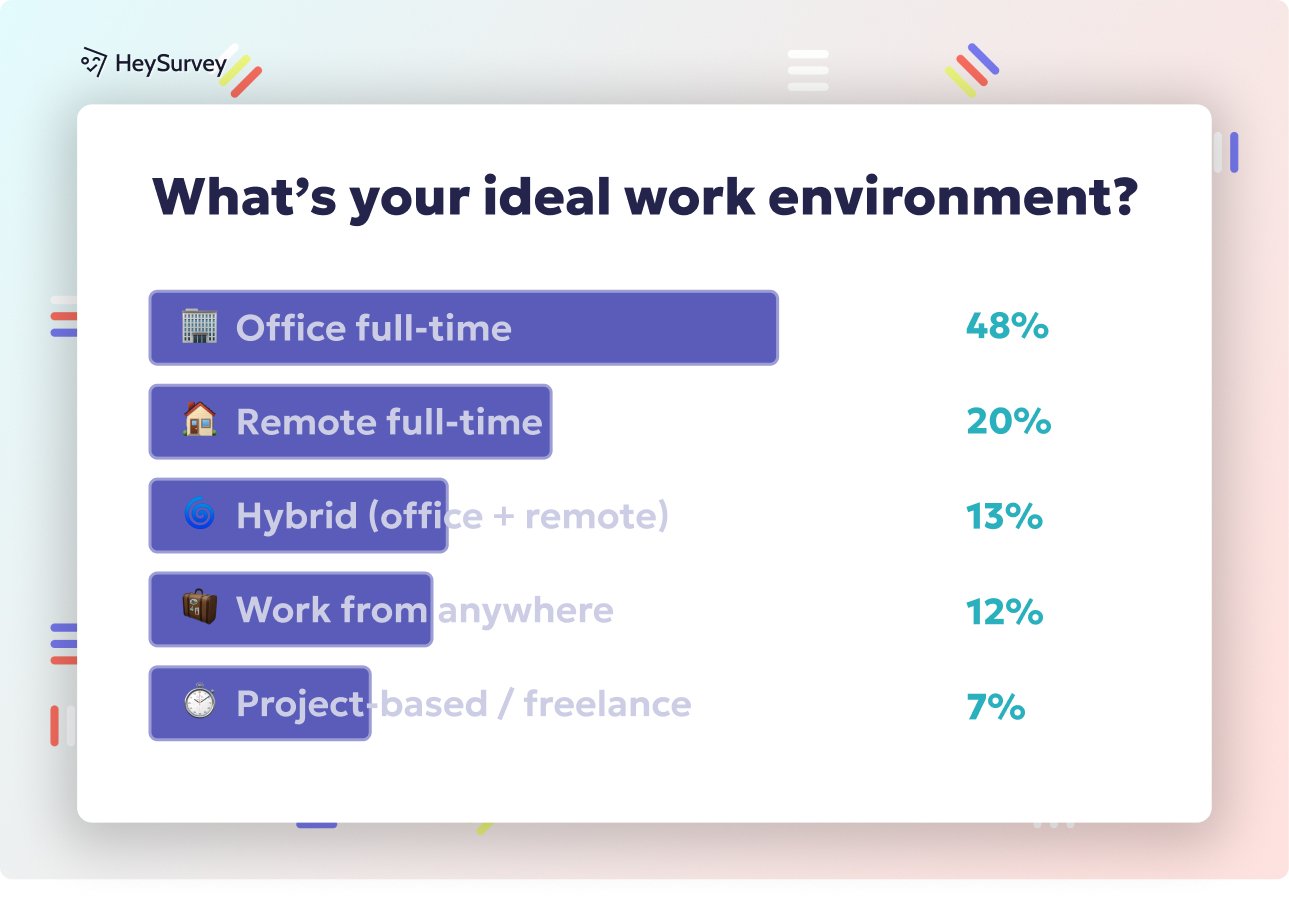
32 Coaching Survey Questions: Types, Uses & Examples
Explore 25+ coaching survey questions across key types to boost coaching impact, measure success,...
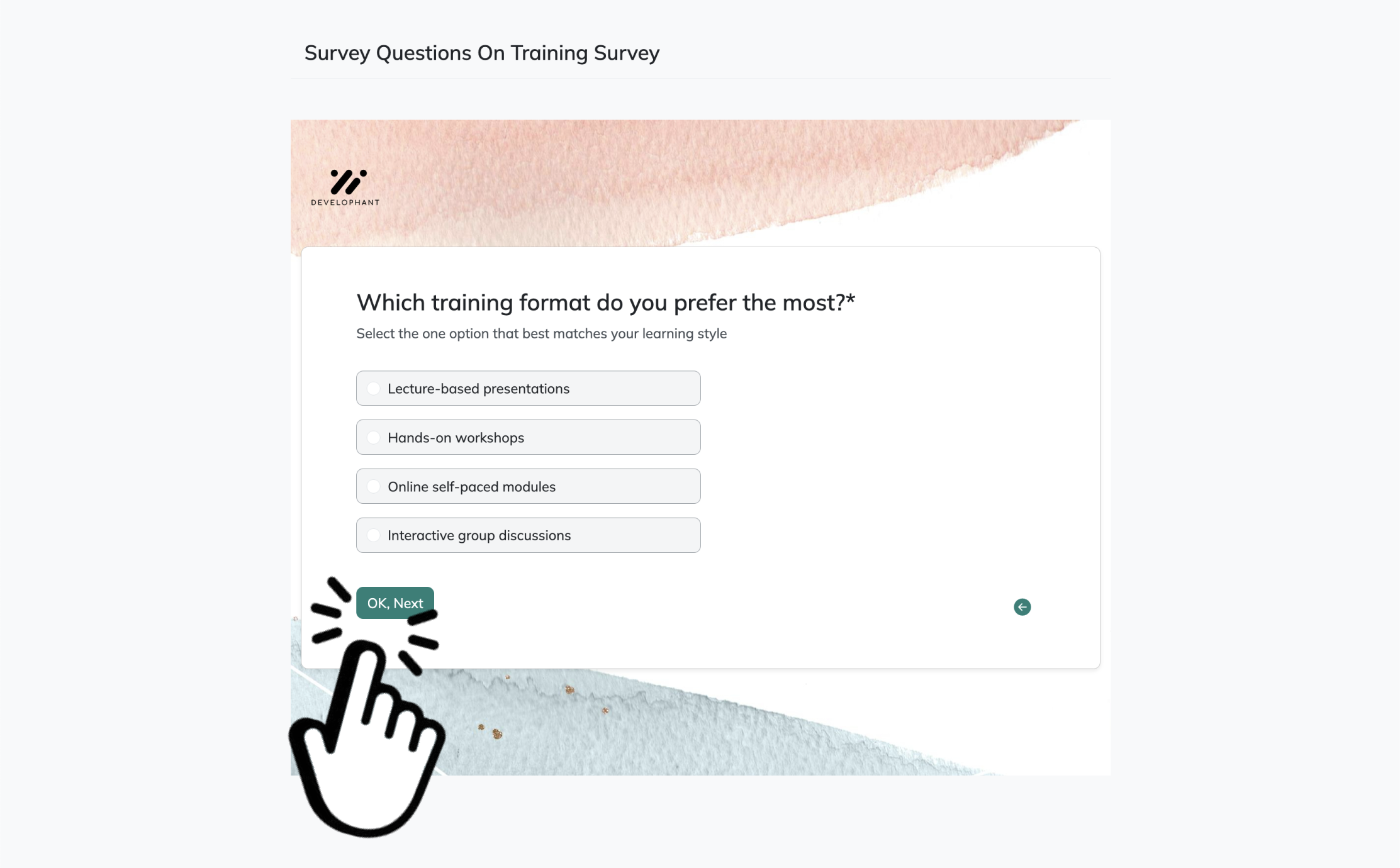
28 Pre Course Survey Questions to Improve Training Outcomes
Discover 25 insightful pre course survey questions to boost training effectiveness. Find the best...
